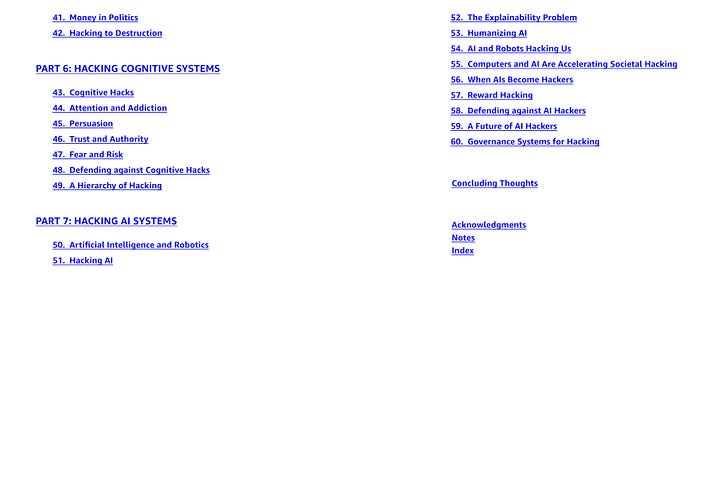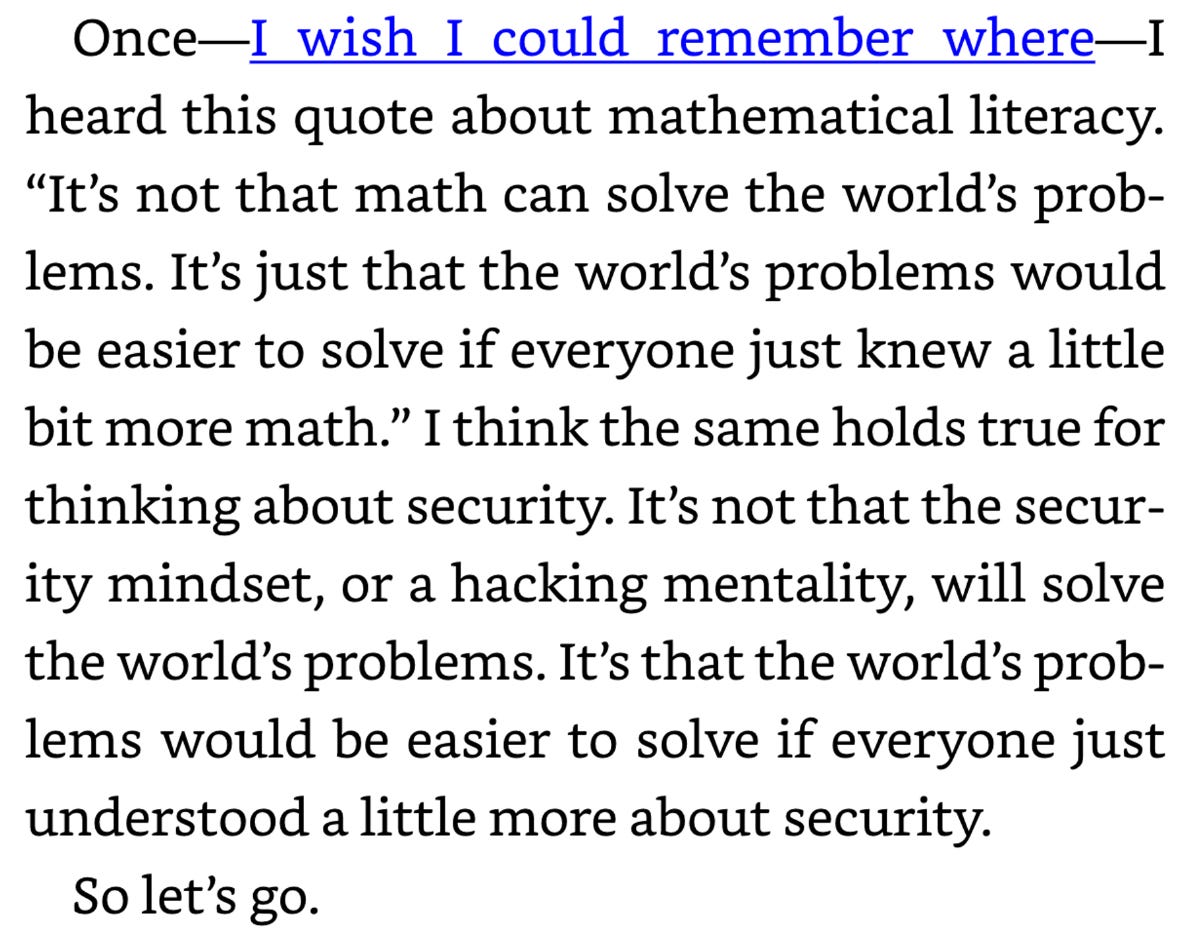Antonym: The Spy Pigeon Edition
Dear Reader
A professor once told me, American history isn’t long but it is very wide. That’s how a week feels at the moment, geopolitically, professionally and in the unfolding of mind-blowing technologies. Writing Antonym feels like a water station on an ultramarathon, a moment to check progress, note emerging issues, and steel your resolve for the next leg. (BTW: If you’ve not seen it, watch The Barkley Marathons on Netflix for the maddest ultramarathon story, it’s brilliant.)
So, let’s grab an energy drink, scoff a pan of cheesy pasta and change our socks while we take stock of where we’ve got to…
The Consternation Game
The big AI news events this week – the US President’s Executive Order and the Bletchley Park AI Summit – are people talking about doing or not doing stuff. Elon Musk reckons BLAH and he told it to the UK prime minister so that’s NEWS.
Elon’s opinions may be caveated with the qualifier that he also believes George Soros’s charitable foundation is trying to destroy Western Civilisation. It’s like Howard Hughes turning up at a 1960s nuclear arms summit meeting and everyone reporting his thoughts while trying to ignore his Mormon minders / blood donors and extremely long fingernails.
Looking back at October 2023 historians may see what ordinary people were actually doing with AI as more notable than the pronouncements of policy and stealth job interviews. The real change is going on under the surface.
For instance, this week I had a voice conversation about product design with ChatGPT while walking my dogs in the park. I learned things and it challenged me to think again about my approach to some work. This is incredible, and it is just scratching the surface.
Call your agent
Describing the trajectory of generative AI innovation in the last Brilliant Noise webinar, a crude model for how general use will evolve was:
2023: Hacker. Make my work easier.
2024: Adviser. How can I do my work better?
2025: Agent. Go and do some things for me and let me know how it went.
The agent stage of use will be when we have learned enough and developed AI processes or apps to the point where we can trust them to do things for us. Think of it like an online grocery shopping experience – you request your shopping list, then accept or reject substitutions when they arrive. Working with an AI agent might expand that job to choosing what you need, making choices about substitutions, and developing an adjusted meal plan for the week. Now extend that idea to managing your diary, drafting agendas for meetings and not just taking notes but developing your priorities and decision-making processes for follow up actions.
The term agent is being used more often in relation to ChatGPT and its competitors and will soon become a bigger, more potent version of the hype-cyclone that is prompt-engineering. That means it will be useful to pay close attention to developments and experiment with it, while being wary of misleading, mis-framing and over-claims.
The laughing CEO
Here’s a lovely statistic from FT Alphaville blog: “Just 11.9 percent of earnings calls feature levity of some kind.”
An analysis of recordings of quarterly earnings calls, showed CEOs that used humour got better reactions, even to bad news:
The researchers examined the two-day market reaction after earnings calls, and found it tended to be more positive when it had been mirthful. But the results were mostly driven by a more muted response when the earnings were disappointing. Joking around somewhat blunted the impact of bad news, while joking about good results generally didn’t have much impact.
Analysts may read a sense of humour as a sign of underlying confidence about the business, apparently.
This week I’m…
Listening to…
The Rest Is History: Pigeons. Thank you to Harry for his recommendation of The Rest Is History episode on pigeons. This is one of those podcasts that you need to keep in reserve for when you just need something brilliant to brighten your day. I listened to it while trudging home through the detritus of Storm Ciaran this week.
It features the little-known sister agency of MI5 and MI6, MI14d, which during World War II parachuted boxes containing pigeons into occupied France. In each box were also instructions on how to attach a note with any useful information to the bird and release it to fly back to England.
Here’s the episode on YouTube, but naturally you can find it on Spotify or your pod-app of choice.
Reading…
A Hacker’s Mind, by Bruce Schneier
Schneier is a famous cybersecurity expert, but this book is about a broader understanding of hacking. He defines it as:
Def: Hack /hak/ (noun) - 1. A clever, unintended exploitation of a system that (a) subverts the rules or norms of the system, (b) at the expense of someone else affected by the system. 2. Something that a system allows but which is unintended and unanticipated by its designers.
The book is about how rich and powerful people understand systems and then hack them to suit their interests. He starts with the example of how Peter Thiel, the venture capitalist, avoided $1 billion in taxes, for instance.
A Hacker’s Mind is a beautifully written book and the product of an exceptionally organised mind. I offer the chapter structure here as evidence:


Then this is the last passage in the introduction
James Ellroy Reveals The Real Reason He Writes | CrimeReads
The most beguiling stylist of modern literature and the crazed chronicler of post-war LA, James Ellroy is so damn readable. This article about why he writes is typical of his style: intoxicating, brutal, immediate. Here’s a passage to tempt you to get in there about his childhood:
I had an afternoon paper route. I delivered the Marilyn Monroe dope-OD headlines. Subscribers stood on their porches and snatched the papers out my hands. A little gear in my head went click-click.
I read the L.A. Herald cover to cover. The daily news vexed me. I was prone to vexation and jejune rage. I was set to start high school in September. It scared me. Everything scared me and enraged me. I lived to read hard-boiled crime novels. I recast myself as the frontier male up against urban estrangement. I talked to women who weren’t in the room with me. That habit persists to this day. I was learning to shut the world out and live within myself. I was that way in ’62. I’m that way today. The summer of ’62 was an all-time horrorshow-blast. I knew I’d write a book about it one day.
Ellroy’s new book The Enchanters is out now.
Watching…
Two film recommendations this week.
Ali & Ava (BBC iPlayer)
Ali & Ava is a beautiful film about a relationship between two damaged people from different communities and age groups. A bit like Past Lives which we recommended a few weeks back, it’s a film which you think will play to familiar tropes, but goes somewhere much more interesting, real and grown up. There’s warmth and love that glows out of this film without ever being sentimental.
Dyad (Netflix)
The casting of Jodie Foster and Annette Bening in lead roles is reason enough to watch this. The true story of an endurance swimmer who, having failed at 30 years old to swim from Cuba to Florida (a hundred miles through shark-infested waters) decides to have another crack at it in her sixties. There’s more Hollywood in this than Ali & Ava, but not so much to spoil an amazing story and touching relationships.
That’s all for this week, folks
If you liked it, put a Share on it – it means a lot. Thanks!
Antony









